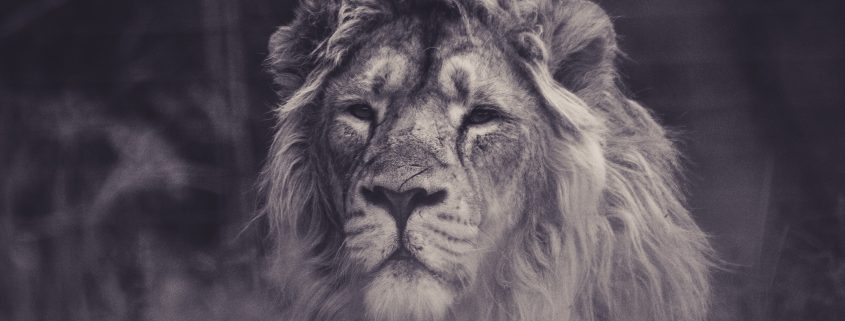Genesis series: Could Adam have been eaten by a lion?
It was March of 1898 and the British were building a railway bridge of the river Tsavo in Kenya. The days were filled with hard labor under the African sun, but the nights were filled with heart-stopping terror. Two lions stalked the camp site in the darkness, slipping into worker’s tents and dragging their victims off to a bone-shattering death. Campfires were stoked at night in the hopes of scaring the lions away and worker’s hastily erected a thorn fence around the perimeter of the camp with Acacia trees, but the man-eaters would not be stopped. Soon after, all work on the bridge ground to a halt as hundreds of laborers fled the appetite of the lions. Lieutenant-Colonel John Henry Patterson eventually killed both lions, one of which measured over 9 feet long and took eight men to carry it’s dead carcass back to the camp (thanks Wikipedia!). The bridge was completed in February of 1899, but the cost in human life was high. Today, the lions of Tsavo are on display in the Chicago Field Museum and the bravery of Patterson is portrayed in the 1996 movie The Ghost and the Darkness starring iconic 80’s actors Michael Douglas and Val Kilmer.
Lions are apex predators and humans will sometimes find themselves on the menu, but have these creatures always been meat-eaters? Did God design lions to be predators or is all predatory behavior in wild animals the result of Adam’s rebellion against God? Could Adam have been eaten by a lion before the Fall?
Once again, Christians tend to fall into two interpretive camps. Young Earth Creationists (YEC) believe that animal and human death followed Adam and Eve’s decision to choose the good without God and Old Earth Creationists (OEC) believe that death was already at work in creation, but it did not put its cold blight on humanity until Adam’s sin. Here’s my position: ADAM COULD NOT HAVE BEEN EATEN BY A LION BEFORE THE FALL, but the reason why I hold this position might surprise you.
Where do we begin? As a Christian, I believe that the Bible is always true and never wrong, but I’ll add a helpful qualifier from NT scholar Paul Feinburg, “…when all the facts are known and …are properly interpreted.” So, let’s open a Bible to the book of Genesis and do our best to interpret the facts.
The YEC View: Death was Not at Work before the Fall of Mankind into Sin
“Then God said, ‘Behold, I have given you every plant yielding seed that is on the surface of all the land, and every tree which has fruit yielding seed; it shall be food for you; and to every beast of the land and to every bird of the sky and to every thing that moves on the land which has life, I have given every green plant for food’; and it was so” (Gen. 1:29-30).
A quick read of the early chapters of Genesis points to the YEC view. Genesis 1:29-30 seems to say that both man and animals were originally vegetarians. Remember, the text is absorbed with the edible vegetation and fruit trees that God is providing for people and the creatures within the Promised Land. It should be noted that there is no prohibition in this passage. The first prohibition (i.e. you shall not) in the story concerns fruit-eating, not meat-eating (2:17), but on the surface, it does seem like everyone and every creature in the land were vegetarians. It is only after the flood that God permits the consumption of animals:
“Every moving thing that is alive shall be food for you; I give all to you, as I gave the green plant. Only you shall not eat flesh with its life, that is, its blood” (Gen. 9:3-4).
Young earther’s find further support for their position in Paul’s letter to the Romans. In a passage designed to show us how the obedience of Jesus is greater in impact than the disobedience of Adam, we read:
“Therefore, just as sin entered the world through one man, and death through sin, and in this way death came to all men, because all sinned” (Rom. 5:12).
Obviously, some kinds of “death” were at work before the Fall: skin cells flaked off, bugs may have been consumed by birds and fish and plants pulled up from the roots by grazers “died”, but human and animal death came into this world only after Adam’s rebellion. This means that lions were originally vegetarians. Adam could only have been eaten by a lion after his eviction from the garden in a newly fallen world, now splashed red in tooth and claw.
The OEC View: Death was at Work before the Fall but not in the Garden and not in Humanity
“Then God said, ‘Behold, I have given you every plant yielding seed that is on the surface of all the land, and every tree which has fruit yielding seed; it shall be food for you; and to every beast of the land and to every bird of the sky and to every thing that moves on the land which has life, I have given every green plant for food’; and it was so” (Gen. 1:29-30).
First, let’s make the main thing the plain thing. Genesis 1:29-30 is less about the menu and more about the generosity of God who provides for His creatures. Note the phrase, “Behold, I have given…” (1:29). The point of these verses is not to suggest that lions were or were not vegetarians, but that all creatures received their sustenance from God. This stands in contrast to pagan stories where man is created to toil in order to feed the gods and free them up from manual labor.
Second, we must resist the urge to read a menu-restriction into the story where there isn’t one. Strictly speaking, the text does not say that meat could not be eaten or that only fruit was to be eaten. There is only one prohibition (i.e. you shall not) in the story and that involves a test of man’s obedience (2:16-17). The text isn’t interested in answering all our questions about the full range of menu options; it has a different story to tell. Please refer back to my earlier posts about how to read the early chapters of Genesis.
There are clues in the text, however, that lead me to believe that death was already at work in the animal kingdom outside the Garden. By themselves, these are not very load-bearing, but when you put them together they open the door to the possibility of death at work before the Fall.
1. The Protection Motif
“Then the LORD God took the man and put him into the Garden of Eden to cultivate and keep it” (Gen. 2:15 emphasis mine).
This is not the first time we read that God “placed” Adam in the Garden, but the word that Moses uses here in 2:15 is different than the word used in 2:8. Here the word carries the ideas of safety (Gen. 19:16) and rest (Deut. 3:20; 12:10; 25:19). The same word is used of angels seizing the hands of Lot and his family and placing him outside of Sodom before fire consumed the city (Gen. 19:16). Why choose a word that implies safety from danger? Could it be that dangerous things lurked outside the safety of the Garden? Things like lions and tigers and bears, Oh my!
This word is the first hint that danger exists outside the Garden in Eden. God puts Adam in the Garden for his protection and man is safe in His presence. Interestingly, protection from wild beasts is a motif promised by God in connection with His covenants. God promises protection to Noah from wild beasts in Gen. 9:2 and later to Israel in the Promised Land (Exod. 23:29).
2. The implication of “surely die”
“The LORD God commanded the man, saying, ‘From any tree of the garden you may eat freely; but from the tree of the knowledge of good and evil you shall not eat, for in the day that you eat from it you will surely die’” (2:16-17).
Here we find provision, and for the first time in the story, prohibition and the threat of death. Adam may eat freely (that’s generous provision), but one fruit is excluded from the menu. Should Adam disobey God, death would result, but doesn’t this assume that Adam had some understanding of death? And if he did, where did he get this understanding? I can imagine danger and death at work outside the garden and Adam being aware of it.
3. The Creation of Wild Beasts and Prey
“You appoint darkness and it becomes night, in which all the beasts of the forest prowl about. The young lions roar after their prey and they seek their food from God. When the sun rises they withdraw and lie down in their dens” (Ps. 104:20-22).
Psalm 104 is a poem expressing God’s care and delight in His good creation. The psalm follows the creation account of Genesis 1 with each day of creation as a starting point for praising God. All of creation is dependent on God, including the lions who roar after their prey. Interestingly, lions are created as meat-eaters in this poetic retelling of the Genesis 1 creation story. In this creation poem, death is at work in the animal kingdom, “You take away their spirit, they expire and return to their dust” (104:29).
What about Romans 5:12? A careful reading of Romans chapter 5 reveals that Paul is concerned with death at work in humanity. It’s focus is on man and the impact of the two “Adams” on people, not the animal kingdom. I would not press Romans 5 into the service of answering our questions about animal predation before the Fall.
Taken together, the above texts and their implications keep me open to the idea of animal predation before the Fall. It seems as though death was at work, not in man, but in the animal kingdom outside the Garden. This view compliments the fossil record which shows the death and extinction of many animals before the later creation of mankind (including dinosaurs).
So, could Adam have been eaten by a lion?
Even though death may have already been at work in the animal kingdom, Adam could not have been eaten by a lion before the Fall because God had “placed” him in the Garden (Gen. 2:15). The Garden in Eden was a place of safety and rest in God’s presence. He would have been beyond the reach of tooth and claw. This is a timeless spiritual lesson for us. Everything good is to be found in God’s presence, but outside of the presence of God we find danger, death and destruction.
Death is a terrible judgment on humanity. In the words of the rock band Switchfoot, “We were meant to live!” The death of Jesus on the cross is not only the end of our moral-debt before a holy God, but the death of Death itself. Everyone who puts their faith in Christ Jesus may have eternal life and be raised from the dead to enjoy a New Creation in the presence of God. It is on this New Heaven and New Earth that “the lion will lie down with lamb” (Isaiah 11:6). Here’s a parting question for you to ponder: If God were to ask you why He should let you live on His New Earth, one where peace reigns and the lion lies down with the lamb, what would you say?
Next Time: Who were the “sons of God” in Genesis 6?



